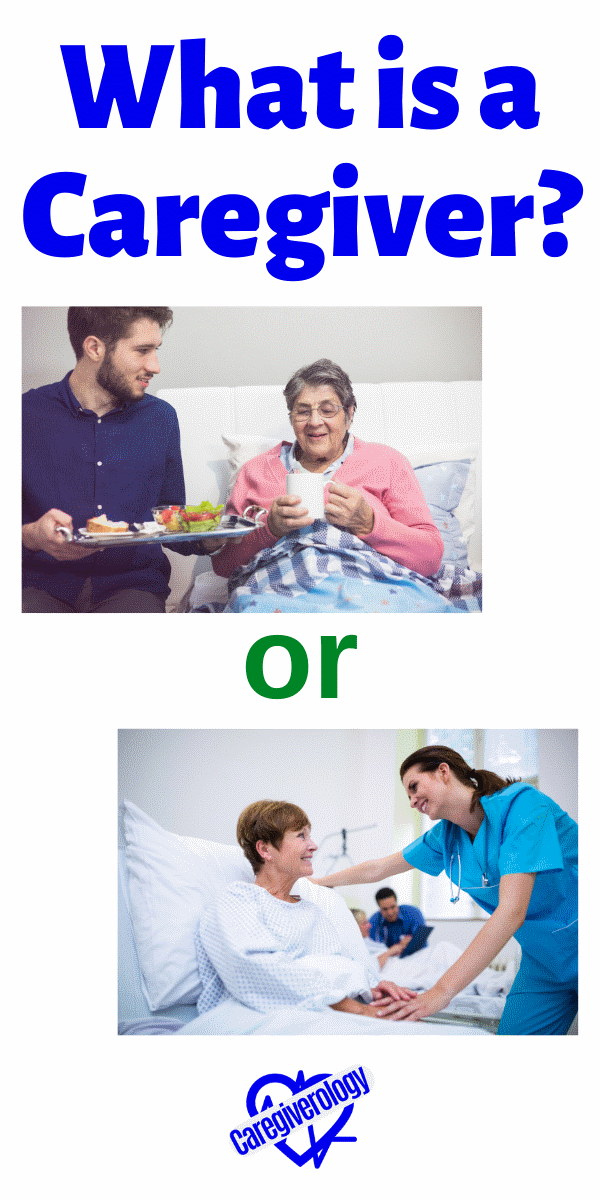What is a Caregiver?
This may sound like a simple question but it is surprisingly complex. The term caregiver has been used to describe a variety of different people ranging from family members who care for their loved ones to healthcare workers in the medical field.
But what does this term mean to you? If someone simply tells you "I'm a caregiver," what do you think they do? If you consider yourself one, what do you do?
Definition Google Why Preference Evolution Change Experience
The Actual Definition
According to dictionary.com, caregiver is defined as "a person who cares for someone who is sick or disabled."
According to Merriam-Webster, it is defined as "a person who provides direct care (as for children, elderly people, or the chronically ill)."
This makes the term very broad. So broad in fact that there are many people who are caregivers but don't even know it. Many people take care of their parents or grandparents believing that it is just a part of their daily lives and don't see the need to place a label on it. But these definitions say otherwise.
Caring for someone can mean anything from simply making a phone call on their behalf, to performing extensive surgery on them. Although both of these things couldn't be more different from each other, they are still acts of caring for someone. They are actions performed for the benefit of another individual other than themselves.
According to Google
While researching this term, many articles tend to define a caregiver as someone who helps an individual perform activities of daily living (ADLs) such as bathing, eating, and companionship but places healthcare workers in a different category. Is this the proper way to use this term? How many people associate the term with only this group of individuals?
When I googled "What is a caregiver," one of the top results was from Caring Senior Service. The article has a section titled "Caregiver vs Nurse" and goes on to describe the differences between to two. It states specifically that caregivers do not perform medical care. However, it does go on to define different types of caregivers such as private-duty caregiver, independent caregiver, family caregiver, and respite caregiver.
Another article on aging.com, in regards to what a caregiver is, states "In the context of elderly care, this job title typically refers to a private duty home caregiver or senior caregiver." Note that it refers to it as a job title. It also goes on to state that they are not typically considered healthcare professionals and do not work under the direction of a doctor or nurse.
And yet another article from John Hopkins medicine states "40 million Americans are providing care for an adult family member or friend, yet few of these identify themselves as caregivers." However, it goes on to state that these individuals are actually considered family caregivers but it also mentions that there are professional caregivers such as doctors and nurses.
As I continued my search, I noticed a general pattern of similar information but I also noticed some potentially conflicting information on who exactly is considered a caregiver. It seems that it is largely up for interpretation and differs depending on who you ask. Has it always been this way?
Was the famous nurse from the 1800s Florence Nightingale considered a caregiver even though the term didn't exist at the time? According to an article on Hope Grows, she absolutely was and is still considered a caregiving icon to this day because of her contributions to nursing.
All throughout my years working in the medical field and going through nursing school I have heard us being described as caregivers. Yet when I search the term online, we are primarily absent. I don't necessarily find this offensive, but I do want to clear the air on what this term means to the average person.
Why Does It Matter?
Don't mistake my concern about the definition as nitpicking about something that doesn't matter. Why do we have to put labels on everything anyway? Does it really matter what it means? Well, I'm sure it does to many individuals and it certainly does to me as I've based an entire website around it.
The term is rapidly becoming more and more widely used. I feel like we should all understand exactly what people mean when they use the term. This will prevent confusion on what a person is or should be doing when we refer to them as such. Their role will be clearly defined and understood.
To my surprise, the term hasn't been around as long as I thought it has. According to google books, it first showed up in publications in the 1950s but it wasn't commonly used until the 1980s and has been growing in popularity over the past few decades. That is fairly new for a term that has such a strong presence in our society today. It's no wonder it hasn't yet quite found its footing.
My Preference
How would I like the term caregiver to be used personally? I like the idea of having it be a broad term that defines many different people fulfilling many different roles. The textbook definition defines it as such and this website bases it off of that mentality.
I embrace the term because even though I am a healthcare worker, I still give care to others. Defining us as such evokes a mentality that creates a stronger bond with our patients. Many other employees I have worked with over the years feel the same way. I have even heard us being described as such in staff meetings to encourage us to treat our patients as if they were a member of our own family. This is how the medical field should be viewed.
However, I am only one person with my own opinion and can't change the evolution of a word. If over the years the term has become synonymous with a specific set of individuals, then I need to treat it that way as well so I don't add to the confusion.
Language evolves and adapts over time and we have to be willing to adapt with it if we wish to communicate with others effectively. Just read an excerpt from the King James Version of the Bible or a Shakespeare play to see how English has changed throughout the years.
This Website's Evolution
When I created this website with the word "caregiver" as the focus, my goal was to unite caregivers everywhere and provide a source where they can find support and learn useful information. I wanted to build a place where professionals and non professionals alike could collaborate and help each other. You may think this goal sounds too broad and ambitious. Well, it may be but it was and still is my dream.
Over the years, my article topics have covered multiple subjects. At the start, I was a certified nursing assistant (CNA) which is someone who gets paid to perform many ADLs that individuals can do for their loved ones at home without a license. I then became a registered nurse (RN) and began adding information that required such a license in order to perform them.
This has caused the topics of this site to be very broad. Has this caused my focus to suffer? Have I abandoned topics too quickly only covering the very basics when I should have gone more in depth? Does this turn visitors away thinking that this site was not made for them? These are questions I don't have a clear answer for but they do concern me.
Time for a Change?
When it comes to helping others, some people narrow their focus to very few select individuals in order to give themselves enough time to help them immensely while others focus on a greater majority but often never get personal enough to make a big impact. I personally want to do both. Is this causing me to not be as efficient as I could be?
Maybe it is time for me to put my focus on a more specific targeted audience. This will inevitably abandon many of my visitors I've acquired from future content on this website but if it means creating a more helpful resource for other visitors, I believe the change could be worth it.
I don't want people to just pass by this site and never return. I want my audience to become fans exploring everything this site has to offer and eagerly anticipating the next post. I've heard the best way to do this is to speak directly to a very targeted set of individuals and to be as personal as possible. I'm not quite sure I'm achieving this.
Speaking from Experience
If I do switch my focus, what will that change look like? If I gravitate towards using the caregiver term for topics that other websites are using it for, it will be a shift to speaking to individuals who are caring for a friend or loved one from home. Unfortunately, this is something that I'm not too familiar with.
My primary experience is working in a hospital in the medical field which is why I often cover those topics more thoroughly. I believe experience overpowers education any day. I could educate myself more on what it is to care for others in a home setting, but would my content be as authentic?
People who speak from experience are a lot more valuable than people who have only educated themselves on a topic. This is partly why I've created ways to hear from others. I enjoy posting content from people who have experienced what many others are going through and can offer their own insight. This to me seems more valuable than me trying to put myself in their shoes.
What do you think of when viewing this website? Is it organized in such a way that benefits people from many different walks of life or does it suffer from mediocrity by refusing to tailor to a very specific type of person? Feel free to let me know in the comments section down below. I want your opinions to be honest no matter how harsh they may sound. Together we can take this site to the next level.
Do you disagree with something on this website?
From What is a Caregiver to Home
References:
https://www.dictionary.com/browse/caregiver?s=thttps://www.merriam-webster.com/dictionary/caregiver?src=search-dict-hed
https://www.caringseniorservice.com/blog/what-is-a-caregiver
https://www.aging.com/what-is-a-caregiver/
https://hopegrows.net/news/florence-nightingale-anne-sullivan-caregiving-icons
Google Books Ngram Viewer Caregiver Term
Recent Articles
-
What to Expect During Post-Operative Recovery at Home - Caregiverology
Apr 08, 25 08:21 PM
Surgery may be over, but the journey to full recovery is just beginning, and for many people, the hardest part happens after they leave the hospital. -
How to Plan for Aging: Financial, Health, and Lifestyle Considerations
Mar 29, 25 12:40 PM
Did you know that 70% of people over 65 will need some form of long-term care? Yet, many delay planning until it’s too late. Aging is inevitable, but how we experience it depends on preparation. -
Speech Disorders: How to Know When It's Time to See a Professional
Mar 27, 25 07:05 AM
When it comes to human interaction, we need to be able to communicate effectively.





New! Comments
Have something to say about what you just read? Leave a comment in the box below.